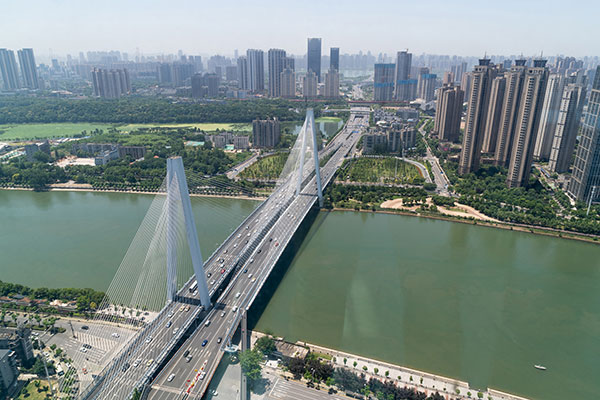Five shares doing their bit to save the world from climate change
8th November 2022 08:52
by Nina Kelly from interactive investor
‘Sponge city’ and Thai cave rescue firms could be among a slew of ‘saviour stocks’ we rely on as the world gets warmer and weather becomes more chaotic.

It’s grey and chilly – a typical November in the UK – and summer is a long way away, yet I remember the searing 40C temperatures we all experienced last year. On trips to my parents’ house, I found relief in their new air-conditioning unit – bought to deal with another UK heatwave.
It wasn’t the only memorable weather of the year. Listening to the news, I imagined having to go about daily life under the ‘heat domes’ that emerged in the US, or the brutal 49C heat experienced in Pakistan. From catastrophic floods and massive wildfires, to mega-droughts and melting ice, extreme climate-change induced weather is already here.
- Read about: Free regular investing | Opening a Stocks & Shares ISA | Cashback Offers
In her book The Story of More, geobiologist Hope Jahren warns that “it is precisely because no single solution will save us, that everything we do matters. Every meal we eat, every mile we travel, and every dollar we spend, presents us with a choice between using more energy than we did last time or less. You have the power. How will you use it?”
Aside from our individual choices in how we go about our lives, various innovative firms could help us fight the consequences of a warming planet.
Against the backdrop of the COP27 climate change summit in Sharm el-Sheikh, Egypt, we focus on some of the companies offering us hope.
Arcadis
Wuhan, China, is perhaps best known as the site of the world’s first Covid-19 outbreak, but it is also one of the pilot locations, chosen by the Chinese government, for the ‘National Sponge City’ programme, a flood management solution for urban areas.
Low-lying Wuhan, a city of lakes, is situated at the confluence of the rivers Yangtze and Han. Such geography means the city is prone to flooding, particularly during the monsoon season, and climate change could lead to more frequent and severe floods and storms. On top of that, Wuhan has experienced rapid urbanisation – it is home to 14 million people - and waterlogging is a particular problem.
- COP27: growing calls for massive global tax on Big Oil
- The investments that will keep growing – even during a recession
With a market cap of 3.122 billion euros (£2.6 billion), Dutch engineering firm Arcadis (EURONEXT:ARCAD) says that it is “delivering sustainable design, engineering and consultancy solutions”. Arcadis provided technical, policy, and programme management-related advisory services in Wuhan, which lead to such innovations as ‘permeable pavements’ and ‘green infrastructure’, which act as ‘sponge features’ to soak up water.
Liao Baozheng, a retired electrical engineer, told the Guardian that: “In Wuhan’s scorching summer, it’s cooler here as the lush vegetation brings down the temperature by two or three degrees.” It is a welcome side-effect of all that greenery absorbing the water.

Wuhan, pictured above, has targets for how much land must ‘reach sponge city standards’ by 2030, but China is not the only place Arcadis is at work.
In Lower Manhattan, New York, it has helped create a plan that involves extending the shoreline to protect the area from “climate change threats such as increased storm surge, tidal waves and severe rainfall”. As Arcadis explains on its website, “Lower Manhattan is particularly susceptible to the impacts of climate change, including rising sea levels, coastal storms and intense precipitation.”
Because of Arcadis’ assistance, 62,000 residents and 19 subway lines can be protected, and estimated losses of $37.8 billion (£33 billion) can be avoided in two low-lying districts, including the financial area that is home to Wall Street.
Xylem
While Wuhan and New York are dealing with an excess of water, other areas grapple with scarcity, and climate change is likely to exacerbate droughts, water shortages, and disrupt precipitation patterns.
Global water technology company Xylem (NYSE:XYL) says it “helps utilities and businesses build resilience, with technologies, including water reuse solutions, that help ensure a continuous supply of safe water in the face of scarcity caused by climate change, and storm and wastewater solutions that help reduce sewer overflows during extreme weather”.
Desalinisation of seawater, for example, could be a partial solution to water scarcity in the future, and desalination is one of Xylem’s many offerings.
The US-headquartered company, whose experts assisted in the rescue of a football team trapped in a flooded Thai cave in 2018, has a presence in more than 150 countries and 17,000 staff.
On 1 November, Xylem reported third-quarter revenue of $1.4 billion. Patrick Decker, president and CEO, said; “Demand remains resilient across our largest end-markets, and disciplined operational execution delivered double-digit revenue growth with strong margin expansion.
“We anticipate our momentum will continue driven by the essential nature of the services we provide. Our strong backlog and bidding pipelines support that outlook. The team, from our factories to our channel partners, continues to demonstrate resilience in managing through a dynamic environment, as our customers and communities invest in essential water infrastructure. Based on this strength, we are further raising our full-year guidance for both revenue and earnings per share, with continued confidence in Xylem’s longer-term growth outlook.”
EZGO Technologies
“There are nine billion bicycles in Beijing”, sang Katie Melua, but how many are now e-bikes, I wonder?
Cutting CO2 vehicle emissions is an obvious target in the war on climate change, and particularly in crowded and polluted cities such as Beijing and Shanghai. Fledgling firm EZGO Technologies (NASDAQ:EZGO) is a Nasdaq-listed company selling e-bicycles and batteries, and offering e-bike rentals to the Chinese market.
Based in Changzhou, China, and with a $10.1 million market cap and approximately 300 employees, it listed on the Nasdaq in January 2021. The firm was founded in 2014 and the following year the lithium battery cell production line began operation. As well as e-bicycles, it also offers e-tricycles, e-scooters, and ultra-high-speed e-motorcycles.
With China’s population at 1.4 billion, the company should benefit both from the demand for food delivery services, and an expanding middle class that is able to afford those services, as well as a convenient and affordable way to get around.

Ingredion
There’s oat milk in our coffee and vegan burgers on our plates as millions of people embrace plant-based foods.I have written about this before, and how a shift from meat to plant-based alternatives could help alleviate the effects of climate change.
Illinois-based ingredient manufacturer Ingredion (NYSE:INGR)“turns grains, fruits, vegetables and other plant-based materials into value-added ingredient solutions for the food, beverage, animal nutrition, brewing and industrial markets”. Ingredion has developed formulations for plant-based alternatives including frankfurters, seafood, burgers, sausages and chick’n (sic).
Ingredion has 19,000 customers in 120 countries and its accolades include being named among the world’s most-admired companies by Fortune for the 13th year running in 2022. The list included 640 companies in 28 countries and was based on executives who work at the companies in that group.
GSK
FTSE 100 big pharma firmGSK (LSE:GSK) says that “climate change is already increasing the transmission and spread of vector-diseases, including malaria and Dengue fever, and water-borne diseases, including cholera” in a 2021 document entitled Putting health at the centre of action on climate and nature.
GSK worked with global non-profit PATH and other partners to develop Mosquirix, the first vaccine to help protect children against the deadliest form of malaria, P. falciparum. The World Health Organisation says that more than 260,000 African children under the age of five die from malaria annually, and gave its backing to the vaccine last year.
GSK, which in July demerged its consumer healthcare business Haleon (LSE:HLN), has a stock market value of almost £60 billon. This month, the company reported third-quarter results showing both sales and profit beat City expectations, and helping it raise expected growth forecasts for full-year revenue and earnings.
Thomas Breuer, chief global health officer at GSK, says “new medicines are needed for the treatment and prevention of diseases most affected by climate change, to alleviate the impact of current threats and be better prepared against future pandemic risks.”
These articles are provided for information purposes only. Occasionally, an opinion about whether to buy or sell a specific investment may be provided by third parties. The content is not intended to be a personal recommendation to buy or sell any financial instrument or product, or to adopt any investment strategy as it is not provided based on an assessment of your investing knowledge and experience, your financial situation or your investment objectives. The value of your investments, and the income derived from them, may go down as well as up. You may not get back all the money that you invest. The investments referred to in this article may not be suitable for all investors, and if in doubt, an investor should seek advice from a qualified investment adviser.
Full performance can be found on the company or index summary page on the interactive investor website. Simply click on the company's or index name highlighted in the article.